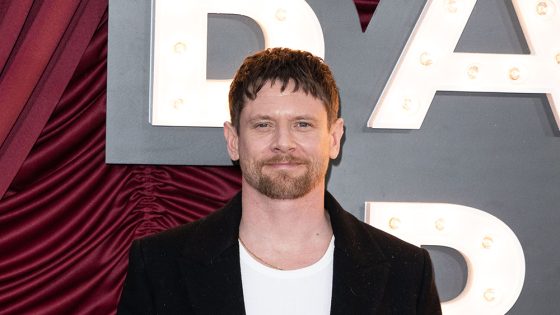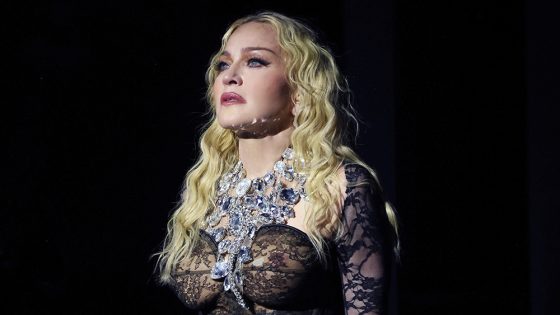In “Back to Black,” Jack O’Connell’s Blake Fielder-Civil comes into the life of Amy Winehouse — played by an exceptional Marisa Abela — with seductive bravado, sweeping the singer off her feet on their first meeting in a London pub thanks to, among other things, a lip-synced rendition of the Shangri-La’s “Leader of the Pack”.
As the divisive biopic, directed by Sam Taylor-Johnson and released in the U.K. by StudioCanal this Friday (and in the U.S. by Focus Features on May 17), agonizingly portrays, the smitten pair quickly descend into violent self-destruction — a “toxic co-dependency” as Fielder-Civil later describes it in the film — fueled by alcoholism and drug abuse.
Many may question the ethics of picking at a tragic story that was heavily chronicled and sensationalized by the media in real-time during Winehouse’s final years. But for anyone who’s been tracking O’Connell’s career, the opportunity to see the hugely talented star swagger confidently back into cinemas with a significant role he can truly get his teeth into is something to be relished.
“I guess I can understand why it came my way,” the actor tells Variety of his casting as Winehouse’s estranged husband, soulmate, source of her creative inspiration and object of her addictive obsession.
Indeed, Fielder-Civil feels like a part practically tailor-made for O’Connell, or at least the teenage and 20-something O’Connell when he’d frequently play cocky, troubled youths (something he has previously stated was influenced by his own troubled youth). As it turns out, Taylor-Johnson only had eyes for O’Connell, now 33, when she was casting “Back to Black,” explaining at the world premiere in London that he was “the only person I could think of” to play the role. (O’Connell says he also knows screenwriter Matt Greenhalgh well and “would have been fuming” had it gone to anyone else).
Spending an afternoon with Fielder-Civil — “mainly talking about football” — would also underline his near-perfect suitability.
“When I met Blake, he resembled the kind of guys that I looked up to back in the day, the sorts of characters I’d be drawn to and want to have a drink with and spend time with,” says O’Connell, who — like his character and Winehouse — would bounce around the bars and live music venues of London’s Camden neighborhood in the mid ’00s. “So I felt like I had stuff in common with him and understood the type of geezer that he is, and wanted to handle that authentically and give that portrayal a bit of depth.”
This raw authenticity and depth has been a calling card for O’Connell since the very start of his career, even before his TV breakout as the womanizing bad boy Cook on hit teen series “Skins” (a show that also introduced audiences to Dev Patel, Daniel Kaluuya, Nicholas Hoult and Kaya Scodelario). It was his unmistakable talent and screen presence, especially when it came to displaying the vulnerability behind violent individuals, that charmed critics, even in otherwise poorly reviewed films, and saw him catapulted into the limelight and labeled Hollywood’s next big thing almost exactly a decade ago.
Having already turned heads as an incarcerated teen in the 2013 prison drama “Starred Up,” O’Connell truly earmarked himself for leading man greatness with a swift one-two the following year as a young British soldier in Yann Demange’s IRA thriller “’71” and as an American Olympian and army officer in WWIl drama “Unbroken,” directed by Angelina Jolie. The National Board of Review gave O’Connell the Breakthrough Award, while he was voted 2014’s BAFTA Rising Star, an honor that would later go to John Boyega, Tom Holland, Kaluuya and Letitia Wright.
The roles soon began landing. He appeared as a hostage-taker alongside George Clooney and Julia Roberts in 2016 crime thriller “Money Monster,” a man executed for murdering his children in 2018’s “Trial by Fire” with Laura Dern, an undercover FBI agent in the 2019 Kristen Stewart-starring “Seberg” and as British racing driver Peter Collins in Michael Mann’s “Ferrari” last year. Other announced projects, such as an Alexander McQueen biopic in which he was to play the late fashion designer (and someone he notes was “influencing British culture” around the same time as Winehouse) and a new take on the tale of Bonnie & Clyde alongside Chloë Grace Moretz sadly never materialized beyond the development stage.
Of late, O’Connell has been seen more frequently on TV, starring in Andrew Haigh’s arctic miniseries “The North Water,” Netflix’s adaptation of “Lady Chatterley’s Lover” and Steven Knight’s military period series “SAS: Rogue Heroes” (Season 2 is set for launch on the BBC later this year).
But while his fellow BAFTA Rising Stars have gone on to become Hollywood household names — many fronting major studio franchises and tentpoles — O’Connell’s trajectory, at least on the big screen, hasn’t quite matched the route that was promised back in 2014.
“There are certain ways to navigate it all, and I wasn’t very well-versed in the ways when it comes to the excess stuff,” he says of a dramatic industry introduction that came when he was just 23. While O’Connell refrains from going into detail about the “excess,” around that time he credited his “Unbroken” director Jolie for helping change his mentality, which had previously been to “have the most fun ever” each and every time he left the house.
“I didn’t train,” he explains. “I was literally learning on the job and that includes the press circus of it all and that parade you go on. But I can take a lot of pride from how that thing panned out, and it was very flattering. I feel it was a great year to demonstrate what I was about as an actor.”
2024 should also demonstrate just that thanks to “Back to Black,” a hugely buzzy feature that’s getting a significant release in the U.S., and one in which he’s able to flaunt his considerable screen skills.
“I really back this film. I feel like, when we were there, the whole process of being on this set and how free I felt in front of the cameras… I can really get behind it,” he says.
For O’Connell, for all the noise — good or bad — about “Back to Black” or the various journeys of his career so far, his focus is now very firmly on the work rather than any strategic end game.
“My bread and butter is on set, be it on an indie, on a short with no budget, or a massive film with a seemingly never-ending pot of money, and the collaboration that happens when you’re in there,” he says. “Sometimes it comes off, sometimes it doesn’t and it’s onto the next one. But it’s the work first.”
There’s a distinction, O’Connell claims, “between film stars and actors,” and while he notes it’s not for him to suggest which camp he may be in, it’s clear he’s leaning toward the latter.
“Some people can do both, but my bread and butter is definitely the craft,” he says. “I get off on the work.”
O’Connell’s status as an actor is in no doubt, but he has recently broadened his scope, making his directorial debut with the music video for a track from British music icon Paul Weller’s upcoming album “’66.” (A longtime friend, Weller had originally asked him to appear in the video, but O’Connell suggested he directed it instead).
And despite his assertations, he may well be about to make good on what was predicted and become that bona fide Hollywood star. O’Connell was recently cast in “Black Panther” director Ryan Coogler’s secretive untitled supernatural thriller with Warner Bros., joining an ensemble that — so far — includes Michael B. Jordan, Hailee Steinfeld, Delroy Lindo and fellow Brit Wunmi Mosaku. Details are scarce, but insiders claim its set in the Jim Crow-era South, could involve vampires and may see O’Connell play a racist villain.
Whatever happens next, O’Connell is clearly in a very different headspace to 2014 and seems to have the experience, desire and attitude to handle both the expectations of the industry and himself.
“Of course, there are always things you’d do differently,” he says, looking back. “But it takes a long time to learn. It takes a long, long time to understand how to conduct yourself and understand what’s important and what comes first.”
Is that where O’Connell is at now with “Back to Black”?
“I’m getting there I reckon,” he says. “Well I fucking hope so.”
Source Agencies



